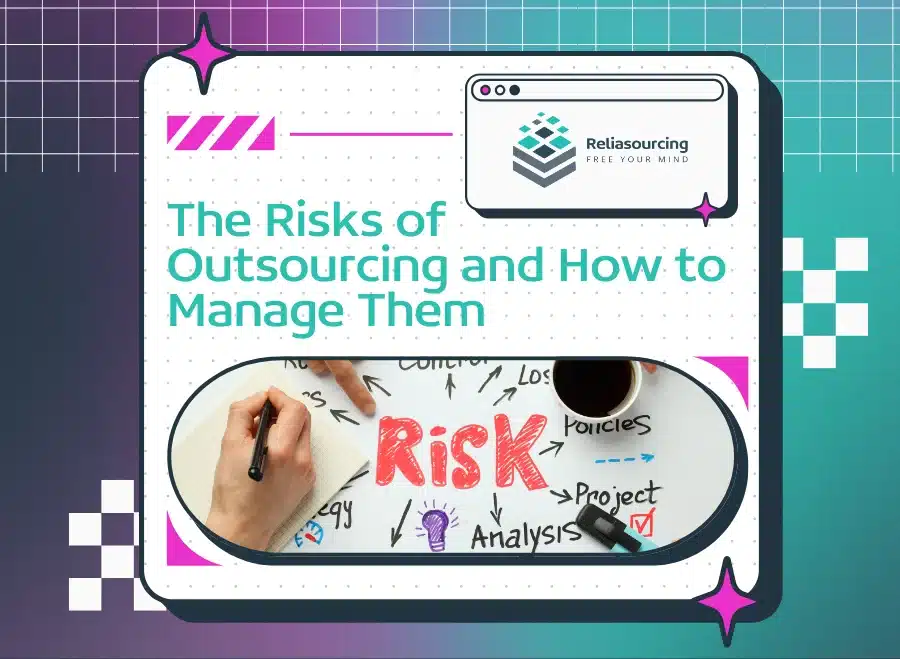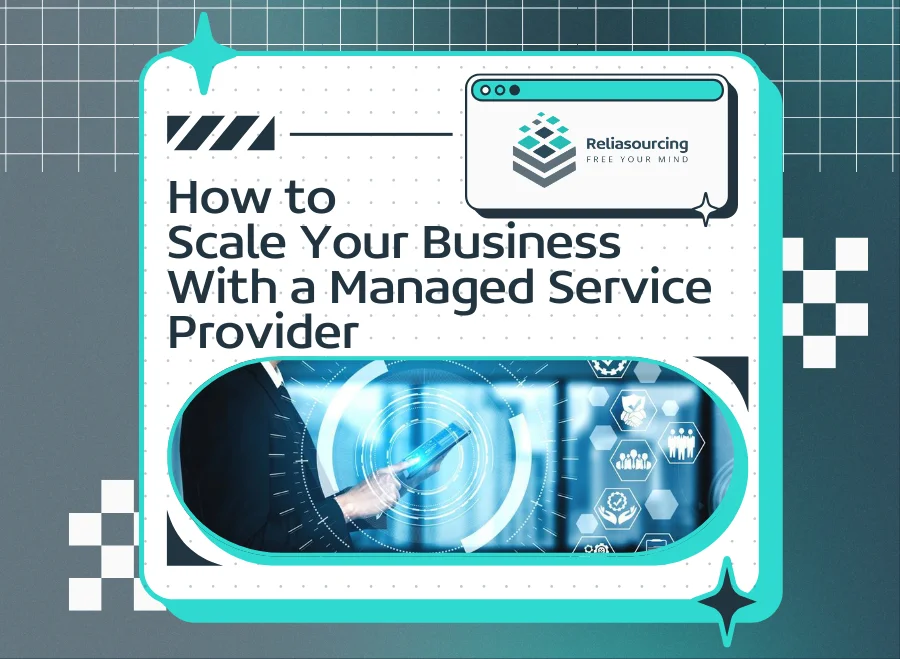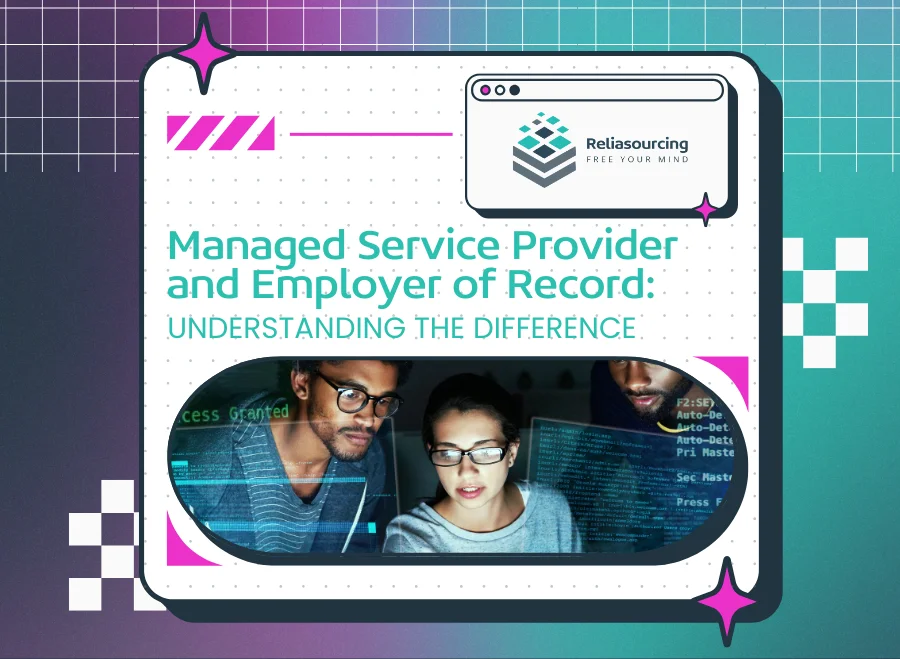Outsourcing is rewriting the playbook for decision-makers. Companies now increasingly leverage external expertise to streamline operations and maintain their edge against competitors, from call centers to cloud migration and software development to customer support. However, along with significant opportunities come considerable risks since, if poorly executed, outsourcing can introduce substantial issues, ranging from communication breakdowns and budget overruns to critical data privacy failures.
Businesses of all sizes, particularly fast-growing startups or enterprises refining their processes, turn to outsourcing to enhance productivity. And for good reason: the right partner can increase speed to market, improve quality, enhance customer satisfaction. Nevertheless, many dive in without grasping the complete array of possible challenges. The result? Unintended consequences, costly missteps, and strained relationships.
The reality is that outsourcing is not a one-size-fits-all solution. Each business has unique operational needs while accounting for cultural dynamics and compliance requirements. The absence of due diligence, clear communication channels, and performance monitoring systems often leads to friction between clients and vendors. Even a technically capable outsourcing partner will give you the short end of the stick if there’s no shared understanding of expectations, metrics, and success criteria.
This article explores the risks of outsourcing, how to avoid them, and why companies, from lean startups to global enterprises, must embrace a proactive, deliberate approach to risk management. Additionally, this article includes an explanation about how choosing Reliasourcing as your outsourcing partner can mitigate risks effectively through alignment, transparency, and collaboration.
The Most Common Risks of Outsourcing
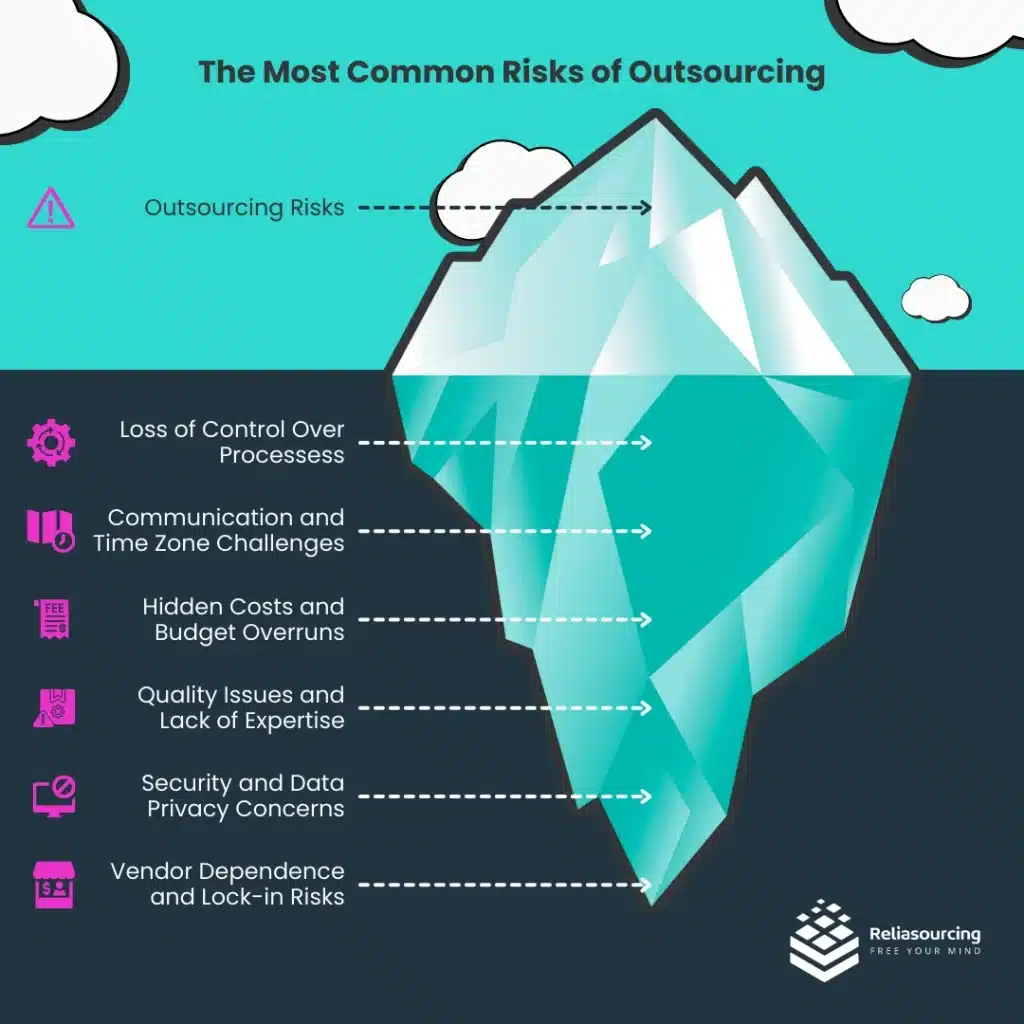
Outsourcing can streamline operations and cut costs, but it also opens the door to a wide range of vulnerabilities that may compromise business performance, long-term strategy, and even customer loyalty if not correctly managed. Organizations often overlook the operational, cultural, and legal implications of transferring control to external entities, particularly when operating across borders or working with vendors in unfamiliar markets.
To truly reap the benefits of offshoring, companies must know the risk factors when employing the strategy. Without a structured approach to outsourcing, companies expose themselves to miscommunication, inconsistent quality, hidden fees, or compliance violations. Risk intensifies when leaders fail to allocate internal resources to manage vendor relationships actively, resulting in an outsourcing dynamic where the external partner’s goals diverge from the client’s core mission and brand standards.
Moreover, the shift to hybrid work and the increased reliance on cloud-based infrastructure have further complicated the outsourcing landscape. Many firms now operate in highly regulated sectors, like healthcare, finance, or e-commerce, where outsourcing mishandled processes or data security can trigger investigations, lawsuits, or even customer backlash. Even minor missteps in vendor onboarding or training can snowball into reputational disasters.
The following sections dive into companies’ most prevalent outsourcing risks, from strategic misalignments to security breaches. Understanding these risks is essential to building a resilient outsourcing model that delivers real value while safeguarding the business.
Loss of Control Over Processes
Maintaining quality and consistency can become difficult when a team works outside your direct supervision. This challenge often arises when companies do not have mature operational frameworks or fail to enforce governance with external teams.
Real-World Parallel. Target’s failed Canadian expansion stemmed partly from outsourced supply chain and IT processes misaligned with its core standards. The lack of integration and oversight led to inventory issues, empty shelves, and a $2.1 billion loss.
Risk Impact. Poor performance, brand inconsistency, customer dissatisfaction, and weakened internal controls.
Communication and Time Zone Challenges
Global teams often struggle with misaligned working hours, language barriers, and inconsistent updates. However, choosing a location with strong outsourcing infrastructure, like the Philippines, can mitigate many challenges due to its skilled workforce, cultural compatibility, and English proficiency. Still, without overlap in availability and clear communication protocols, deliverables can suffer.
Real-World Example. In 2011, Dell faced backlash after outsourcing tech support and software development overseas, notably in India and China. Customers reported long wait times, ineffective troubleshooting, and language barriers. Complaints became so severe that Dell had to shift back to U.S.-based agents, acknowledging that the move had negatively affected customer satisfaction and brand perception.
Risk Impact. Prolonged response times, poor customer experience, reputational harm, and added operational costs to revert support operations.
Hidden Costs and Budget Overruns
While outsourcing may seem cheaper on paper, poor contract scoping and unclear expectations often lead to scope creep. Careful negotiation of milestones, maintenance, or transition fees usually prevents budget overruns.
Case Insight. IBM’s $110M IT outsourcing deal with the State of Indiana collapsed due to disagreement over performance expectations and poorly defined SLAs. The contract was terminated, resulting in litigation and millions in losses.
Risk Impact. Escalating costs, resource misallocation, and damaged relationships.
Quality Issues and Lack of Expertise
Not all outsourcing vendors have the depth or industry-specific knowledge to deliver the quality work your business needs. Some firms cut corners or delegate tasks to subcontractors without informing clients.
Scenario. A boutique marketing agency outsources its PPC ad operations to a low-cost vendor. The partner lacks experience in their niche, potentially causing irrelevant targeting and a 60% increase in ad spending with no conversions.
Risk Impact. Damaged reputation, reduced ROI, client dissatisfaction.
Security and Data Privacy Concerns
Externally transferring data and processes increases the risk of breaches. The consequences can be severe if your outsourcing provider lacks robust compliance protocols.
Industry Example. In 2021, a US healthcare vendor outsourced transcription services to a third party. Due to weak encryption and poor access control, over 270,000 patient records were exposed, leading to fines and public backlash.
Risk Impact. Regulatory non-compliance, customer distrust, costly breaches.
Vendor Dependence and Lock-in Risks
Relying too heavily on a single vendor for critical processes risks losing operational flexibility. You’re left vulnerable if the provider fails, discontinues service, or significantly raises prices.
Real-World Example. In 2019, Hertz, the global car rental company, filed a $32 million lawsuit against Accenture after a failed website and mobile app redesign project. Hertz had outsourced its digital transformation efforts to Accenture but claimed that the deliverables were incomplete, not mobile-responsive, and lacked key integrations. Despite extending timelines and increasing scope, the project failed to meet expectations.
Risk Impact. Business disruption, costly legal battles, lost revenue opportunities, service outages, and high transition costs.
How to Mitigate These Risks
While risks are real, they are manageable with foresight and structure. Successfully outsourcing processes begins with developing a comprehensive framework that aligns with business goals and operational realities. Some of these include defining deliverables and understanding the cultural, legal, and logistical context of the outsourced work.
Risk mitigation is also not a one-time effort. To mitigate risks effectively, companies must ensure that it remains an ongoing process to minimize risks now and in the future. Likewise, it involves careful partner selection through rigorous vetting, establishing clear service-level agreements (SLAs), and maintaining a transparent, measurable communication loop. Building performance metrics, conducting regular audits, and fostering a culture of accountability also help to reduce the likelihood of misalignment or failure.
Moreover, companies must ensure that internal teams remain engaged throughout the outsourcing lifecycle. Simply put, companies must designate liaison roles, invest in relationship management, and use tools to monitor real-time progress. But most of the risks associated with outsourcing often escalate when businesses ‘set and forget’ outsourced work, assuming vendors operate with the same urgency, context, and quality standards without active oversight.
Setting Clear Expectations and KPIs
Before signing any agreement, define success metrics, responsibilities, communication channels, and escalation points. Use service-level agreements (SLAs) to outline performance expectations.
Checklist for Risk-Aware Outsourcing:
- Document KPIs for each department
- Agree on deliverables and deadlines
- Define communication cadence and platforms
- Specify the escalation hierarchy
- Build in review cycles (weekly, monthly, quarterly)
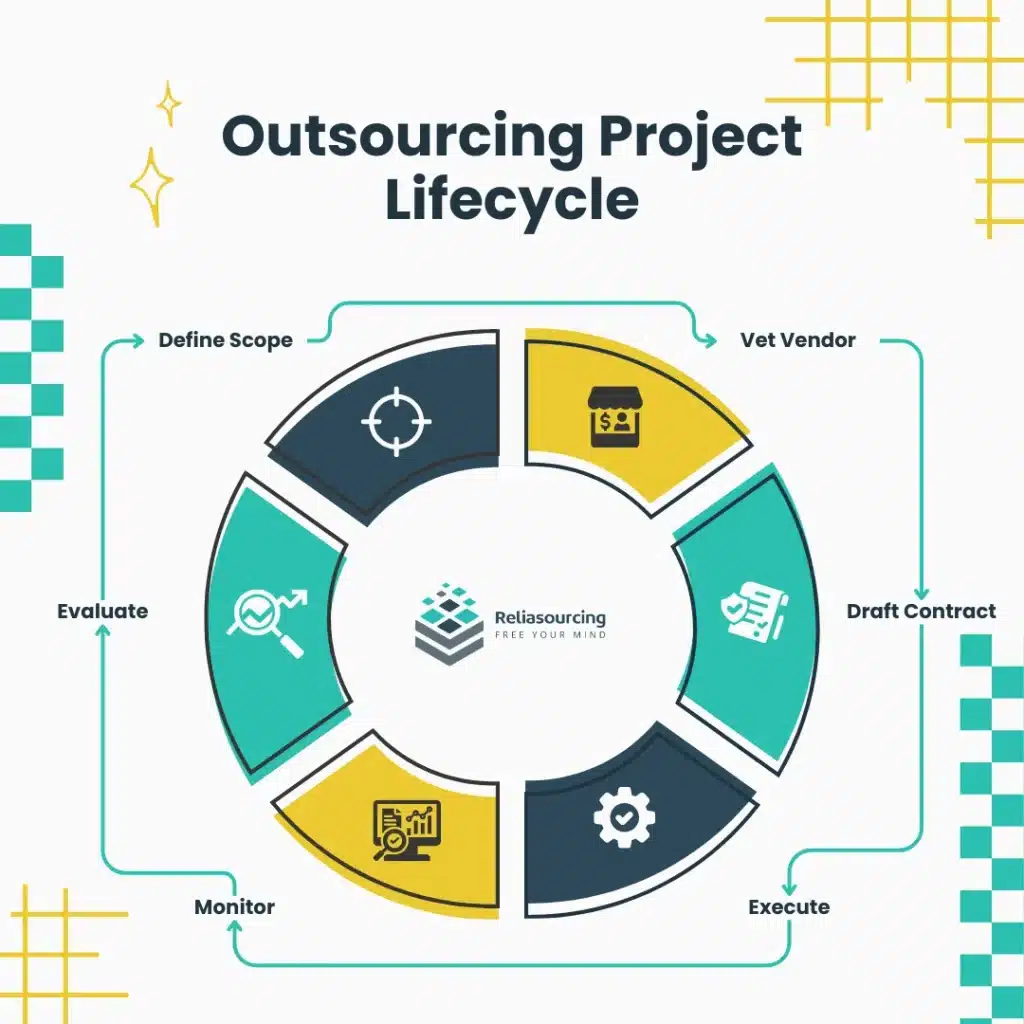
Choosing the Right Outsourcing Partner
Vet vendors rigorously. Look beyond price to assess reputation, industry expertise, legal compliance, cultural alignment, and client testimonials. Conduct interviews, technical evaluations, and pilot projects if necessary.
Key Evaluation Questions:
- Do they have experience in your industry?
- Are they transparent about team composition?
- What governance and security frameworks do they follow?
For companies seeking comprehensive support across multiple functions, leveraging managed services can offer a scalable, efficient solution that aligns with operational goals while minimizing risk.
Establishing Strong Communication Practices
Communication is the heartbeat of successful outsourcing. Use platforms like Slack, Teams, or Asana to maintain open channels. Assign team leads on both sides and set daily or weekly syncs.
Pro Tip: Ensure time zone overlaps, schedule standing check-ins, and build a culture of over-communication.
Managing Contracts and Legal Protections
Your outsourcing contract should protect your business. Work with legal counsel to create clear agreements that cover data privacy, intellectual property, SLAs, and exit clauses.
Clause Must-Haves:
- Penalties for missed deadlines
- Confidentiality and data handling policies
- Dispute resolution protocols
- IP ownership clarification
How Partnering with Reliasourcing helps mitigate the aforementioned risks
Outsourcing often comes with significant challenges, such as misunderstandings, financial mismanagement, and security breaches. However, the right partnership can minimize these issues. That’s where Reliasourcing stands out.
Built with a focus on prevention and strategic planning, our approach ensures that potential risks are identified and mitigated from the outset. Instead of dealing with crises as they come, we create tailored onboarding processes, engage all relevant stakeholders, facilitate thorough knowledge transfers, and utilize advanced analytics to catch minor setbacks before they escalate into serious problems.
Here’s how Reliasourcing directly tackles the most common risks:
- Loss of control. We implement shared dashboards and joint governance structures so you retain full visibility into workflows and metrics.
- Communication challenges. Our teams operate in overlapping time zones and maintain standardized touchpoints, including weekly stand-ups and monthly executive reviews.
- Hidden costs. All pricing models are designed with complete transparency. You’ll never be surprised by hidden fees or vague statements of work.
- Quality assurance. Independent QA teams regularly audit outputs to ensure continuous improvement and alignment with KPIs.
- Vendor Lock-in. We use open systems, shared documentation, and flexible contract structures so you always retain control and portability.
How Reliasourcing Ensures Companies Benefit from Outsourcing
Reliasourcing has built its model around proactive risk prevention and operational transparency since we understand that outsourcing is not simply a business transaction. Trust, alignment, and a long-term vision all build towards a robust and strategic relationship. That’s why our entire delivery framework is designed to anticipate challenges, mitigate potential disruptions, and deliver consistently high performance right from day one.
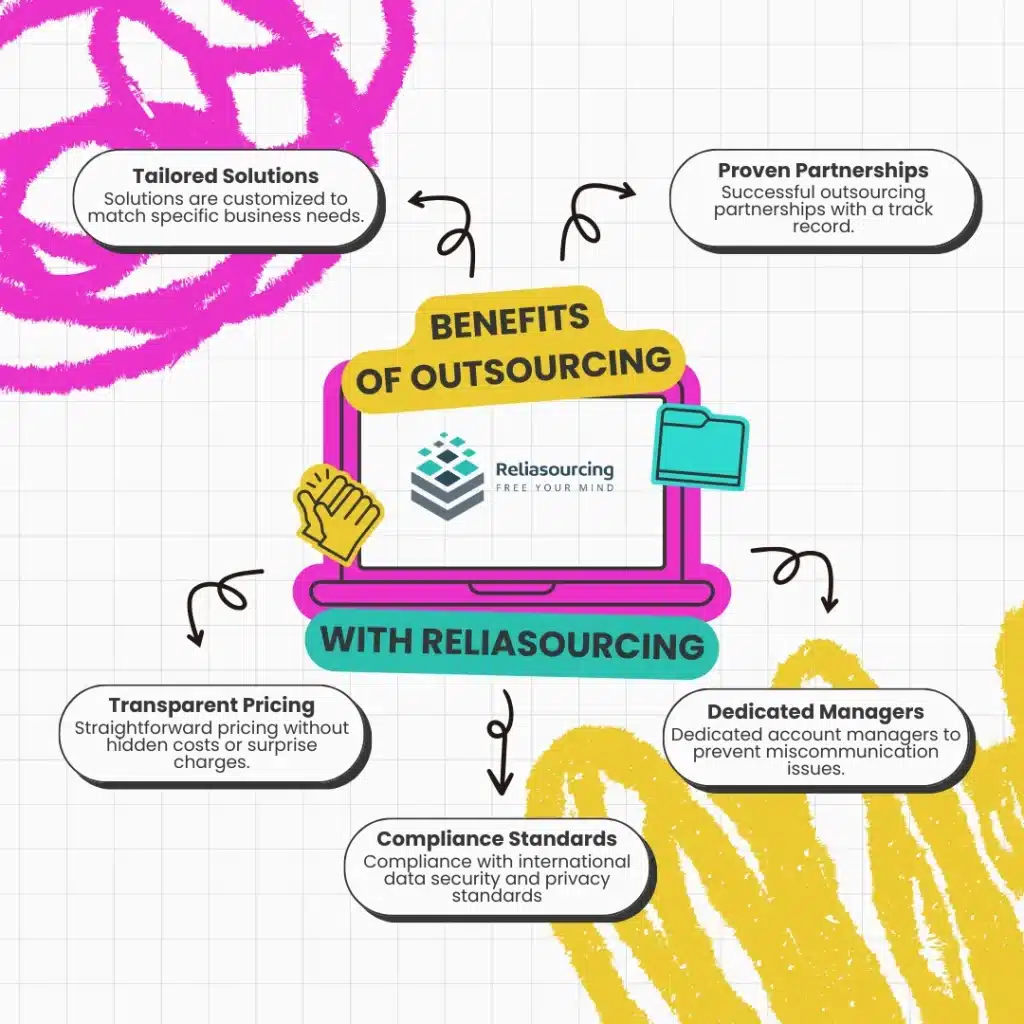
Our methodology begins with a deep dive discovery process, where we work closely with stakeholders to identify what needs to be outsourced and why. We ask critical questions about your workflows, customer expectations, compliance needs, and scalability goals. From this understanding, we craft a custom outsourcing solution that integrates seamlessly with your existing operations.
Likewise, we stay deeply engaged throughout the partnership. Our teams implement rigorous performance metrics and build real-time dashboards for total visibility. We conduct regular business reviews, facilitate bi-weekly syncs, and continuously collect feedback to optimize team performance.
Tailored outsourcing solutions to match business needs
Reliasourcing doesn’t operate in a silo. We view ourselves as an extension of your team, invested in your success. We don’t believe cookie-cutter strategies will do it for anyone. Reliasourcing starts with your business goals and crafts a solution that fits right into your operations, growth trajectory, budget, and goals.
Proven track record of successful outsourcing partnerships
From FinTech to SaaS and logistics, our global experience enables us to foresee challenges and drive measurable impact. We provide client references and performance dashboards to build transparency.
Transparent pricing with no hidden costs
We offer straightforward, fixed-fee pricing with no surprise charges. Cost predictability is crucial, and our services reflect that.
Dedicated account managers to prevent miscommunication
You’ll never wonder who to contact. Each client receives a dedicated account manager who ensures smooth collaboration, tracks KPIs, and escalates issues quickly.
Compliance with international data security standards
We fully comply with global standards, including GDPR, ISO 27001, and HIPAA (when applicable). Our security protocols include encrypted data transfer, two-factor access, and regular audits.
Frequently Asked Questions
What are the biggest risks of outsourcing?
The biggest risks of outsourcing are loss of control, communication delays, quality issues, hidden costs, data breaches, and over-dependence on one vendor. These risks can harm customer satisfaction, profitability, and business continuity.
How can I minimize outsourcing risks?
You can minimize outsourcing risks by outlining clear expectations, vetting the right partner, maintaining consistent communication, and managing contracts with legal counsel. Also, diversify vendors and monitor performance frequently.
Is outsourcing always risky for businesses?
No, outsourcing is not always risky for business. However, outsourcing is often risky when businesses skip planning or due diligence. Proper structure, established through strategic planning, due diligence, and clearly defined workflows, can reduce operational costs, increase flexibility, and enable internal teams to focus on core growth initiatives, all while maintaining oversight and accountability over outsourced functions.
What industries face the highest outsourcing risks?
The industries facing the highest outsourcing risks are industries handling sensitive data (like healthcare or finance), rapid product cycles (tech), or intensive client interaction (support centers). However, with the proper safeguards such as thorough vendor vetting, well-defined SLAs, clear KPIs, data protection protocols, and consistent oversight, these industries can minimize risk exposure and gain the most strategic advantage from outsourcing relationships.
How do I choose a reliable outsourcing provider?
You can choose a reliable outsourcing provider by researching reputation, requesting referrals, reviewing case studies, understanding their security posture, and testing with a pilot project.
Summary & Final Thoughts
It’s clear: outsourcing has its fair share of risks, as much as it has its returns. Organizations now count on external partners to reduce costs and scale faster, innovate more freely, and access niche talent. Understanding why companies choose to outsource in the first place helps frame outsourcing not just as a cost-cutting tactic but as a strategic enabler for growth, innovation, and resilience. But to realize the benefits of outsourcing, you must carefully plan, maintain continuous oversight, and ensure strategic alignment.
Too often, companies leap before they look. They commit to vendors based on price or speed without deeply analyzing long-term compatibility or risk exposure. Without proper due diligence, outsourcing can spiral into costly delays, misaligned deliverables, reputational harm, and even cybersecurity breaches. Challenges become more pronounced globally, where cultural differences, regulation variations, and mismatched time zones contribute to further complications.
The guide outlined the most significant risks—from poor communication to vendor lock-in—and offered proven mitigation strategies, emphasizing that successful outsourcing is rooted in structure and partnership. Thorough documentation of expectations, SLA implementation, regular performance reviews, and selecting providers that align with core values significantly increase the likelihood of achieving positive outcomes. Proactive engagement and an effective feedback loop are essential to resilient outsourcing partnerships.
Why partnering with Reliasourcing reduces risks
At Reliasourcing, we commit ourselves to your success. Our approach is centered on providing tailored solutions that leverage our extensive industry expertise and robust security practices. We strive to empower you to seamlessly reach your goals, regardless of whether you lead an established organization or are nurturing a dynamic startup.
Our dedicated team functions as an essential extension of yours, providing multilingual capabilities along with in-depth compliance expertise. With our track record with our clients, we take pride in being dependable collaborators, ensuring consistent outcomes through a robust operational framework. Anticipating challenges and optimizing processes is part of the job, but we extend this focus strategically to ensure we help you improve efficiency and achieve measurable success in all your endeavors.
Looking to outsource with confidence? Contact us today and discover how Reliasourcing can help your business grow smarter, with fewer risks and greater returns.

